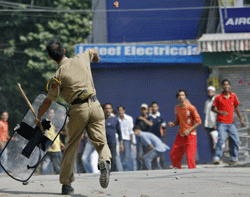UN seeks AFSPA repeal in Kashmir
A week after New Delhi supported a United Nations Human Rights Council resolution censuring Sri Lanka for its armed forces atrocities during the conflict with the LTTE, a Special Rapporteur of the international organisation concluded that extra-judicial killings take place in India too.

After a rare 12-day visit to India’s trouble-spots like Kashmir and Manipur, UN Special Rapporteur on Extrajudicial, Summary or Arbitrary Executions, Christof Heyns, urged New Delhi to repeal the controversial Armed Forces Special Powers Act. He also recommended that the Government should set up a “credible Commission of Inquiry” to probe the extra-judicial killings.
Heyns is likely to submit his report to the UNHRC. Though it is unlikely to cause big embarrassment for India at the UNHRC, it may put New Delhi at unease during the council’s next session in early 2013.
“The main finding in my report is that despite constitutional guarantees and robust human rights jurisprudence, extrajudicial killings continue in India and it is a matter of serious concern,” he told journalists in New Delhi. Heyns is the third UN Special Rapporteur to be allowed by the Government to visit Kashmir. New Delhi had in 2008 allowed UN Special Rapporteur on Freedom of Religion or Belief, Asma Jahangir, a prominent human rights activist of Pakistan, to visit Kashmir on a fact-finding mission.
This was followed by a similar visit by UN Special Rapporteur on Situation of Human Rights Defenders, Margaret Sekaggya, to the Kashmir Valley in 2011.
New Delhi earlier turned out pleas from the human rights organizations like Amnesty International for permission to send fact-finding missions to Kashmir. Heyns’ mission took him to five States – Gujarat, Kerala, Jammu and Kashmir, Assam and West Bengal – over the past 12 days. He visited Jammu and Srinagar during his visits to J&K.
His recommendation to repeal the AFSPA came at a time when J&K Chief Minister Omar Abdullah too joined the chorus for the repeal of the law that gives armed forces sweeping powers to act in troubled areas.
In his preliminary observation, the UNHRC rapporteur praised the openness and willingness of the Government of India to engage on the issue of encounter killings. However, he expressed a serious concern on the issue.
“Evidence gathered confirmed the use of so-called ‘fake encounters’ in certain parts of the country. Where this happens, a scene of a shoot-out is created, in which people who have been targeted are projected as the aggressors who shot at the police and were then killed in self-defence. Moreover, in the North Eastern States, and Jammu and Kashmir the armed forces have wide powers to employ lethal force,” observed the rapporteur.